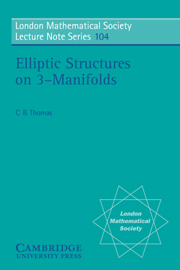Book contents
- Frontmatter
- Contents
- Introduction
- Seifert manifolds
- Groups with periodic cohomology
- Free C2 and C3 actions on certain Seifert manifolds
- The reduction theorem
- Tangential structure
- SL(2, F5)
- Finite Poincaré complexes and homology spheres
- Workpoints
- Appendix: Genus 2 Heegard decompositions for elliptic manifolds
- References
- Index
- Frontmatter
- Contents
- Introduction
- Seifert manifolds
- Groups with periodic cohomology
- Free C2 and C3 actions on certain Seifert manifolds
- The reduction theorem
- Tangential structure
- SL(2, F5)
- Finite Poincaré complexes and homology spheres
- Workpoints
- Appendix: Genus 2 Heegard decompositions for elliptic manifolds
- References
- Index
Summary
It has long been conjectured that if the finite group G acts freely on the standard sphere S3, then the action is topologically conjugate to a free linear action. Equivalently the orbit space S3/G is homeomorphic to a manifold of constant positive curvature, and such elliptic 3–manifolds are classified in terms of the fixed point free representations of G in SO(4), see the book by J. Wolf [Wo] for example. The purpose of these notes is to collect together the evidence in favour of this conjecture at least for the class of groups G which are known to act freely and linearly in dimension three. The main result is that if G is solvable and acts freely on S3 in such a way that the action restricted to all cyclic subgroups of odd order is conjugate to a linear action, then the action of G is conjugate to a linear action. This reduction to cyclic groups (which is false in higher dimensions) depends on (a) the algebraic classification of the fundamental groups of elliptic manifolds and (b) geometric arguments due to R. Myers and J. Rubinstein classifying free Z/2 and Z/3–actions on certain Seifert fibre spaces. The proof is contained in Chapters I-IV; for part (a) we follow an unpublished joint manuscript with C.T.C. Wall [Th-W], and for part (b) the original papers [My] and [R2]. Besides the reduction theorem already quoted the argument implies that the original conjecture holds for groups G whose order is divisible by the primes 2 and 3 only.
- Type
- Chapter
- Information
- Elliptic Structures on 3-Manifolds , pp. 1 - 2Publisher: Cambridge University PressPrint publication year: 1986
- 2
- Cited by



